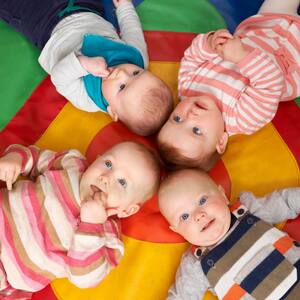OPINION When parents are starting their babies in daycare , a common concern is whether it is good for little ones to be away from their primary carers for long periods of time. But as our recent book Babies in Groups shows, babies as young as six months respond to and enjoy being in groups with other babies. This can reassure parents their child will gain something at daycare they are mostly missing at home: Opportunities to enjoy supervised time in small groups of their peers – eating, learning and playing together.
Our prehistoric ancestors lived, foraged, hunted, defended themselves, and brought up their young in groups. So, it makes sense today’s babies are born with a capacity to enjoy spending time together. Previous research Nearly all previous research about babies’ social and emotional development focuses on their relations with adults (typically their mothers) and almost always studied in pairs.

But as we explain in our book, this is because researchers’ assumptions mostly reflect ideas entrenched in Western cultures that make the stay-at-home mother the be-all and end-all for a baby’s healthy development. Anyone who watches how babies act in larger families, playgrounds, or parent groups, soon sees how attuned they are to group dynamics, especially when around infants like themselves. Our research For 25 years we have been researching whether babies are born already adapted to life in groups.
Or whether this capacity only develops after they form their f.























